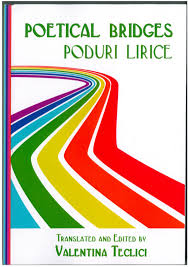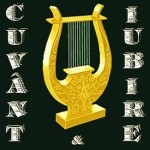Mary CRESSWELL: Poetical Bridges – Poduri Lirice
 In this book, Valentina Teclici has assembled, edited and translated three poems each from 12 Romanian and 12 New Zealand poets. This first volume of Poetical Bridges – PoduriLiriceis published in New Zealand and printed in Romania; it has been reviewed (in print and on the radio) in Greece, Australia and Canada, as well as in its two parent countries. The Romanian/New Zealand community numbers several thousand people, and – in a country that professes support for community languages – bilingual publishing should be supported wherever it exists or is trying to exist.
In this book, Valentina Teclici has assembled, edited and translated three poems each from 12 Romanian and 12 New Zealand poets. This first volume of Poetical Bridges – PoduriLiriceis published in New Zealand and printed in Romania; it has been reviewed (in print and on the radio) in Greece, Australia and Canada, as well as in its two parent countries. The Romanian/New Zealand community numbers several thousand people, and – in a country that professes support for community languages – bilingual publishing should be supported wherever it exists or is trying to exist.
So, about the poems. As far as the translations go, I can’t comment. Certainly the translator has matched lines, structures, and rhyme patterns, but it’s for more educated reviewers than I am to judge. It looks like an amazing job, not least in that the poems are presented in such as way that no one language looks like the dominant one.
The content, however, is a different matter entirely – I had a lot of surprises and learned a lot, always a good thing. First of all, the scenery. I have been many years in New Zealand and had stopped noticing how pervasive the landscape is in poetry. Nature is out there all over the show, and there is no getting away from her. Ever.
Reading the Romanian selections is a reminder that the world contains buildings, cities, skies:
For a while I feel my wings growing
And I try them out – as a young lark,
Stolen by misunderstood bravery,
That bolts him into an unnatural sky.
I am distancing myself from people, rising vertically
Towards a shore of infinite joy … (‘“The Burden” of Today’s World …”, Tudor Opriş, p 23).
Paul Sân-Petru’s forest moves away from us and is not part of us:
Too dark the forest is stretching
Take care, woodman, leave room,
For this swan wood of moonlight
And don’t look at it as being good for fire. (“At the Edge of the Grove”, p 37).
Mariana Gurza’s images of love are entirely structural:
My love, you are a foundation
of the new era’s monastery …
I’ll answer you through a bell
every clink is a whisper, … (“Monastery”, p 115).
Compare these with Dorothy Wharehoka’s very Kiwi “Midwinter” (p 28), where
We are enclosed
in a giant deepfreeze. …
The crisp
crackling
crunchy frost
has gripped us
in his hands.
Another surprise was the sound level. The New Zealand poets are surrounded by noise. “On Te Mata Peak in summer” (p 38), Marie Dunningham hears:
Up there somewhere unseen
skylarks warble their incessant, English song
as boys explore a wilderness that could be the Australian desert. Bill Sutton’s remembered girl
… stripped off all her clothes
and rushed out into lake
splashing and squealing (“The lake” p 76).
For Ian McQuillan:
Birdsong bursts the bubble of night
Cracks open the can of day …
We have to sing
How can you remain silent?
Most of the selections originally written in Romanian seem very quiet – in most of the poems there is unremarked silence, occasionally broken with a whisper:
It’s impossible to fly with you, you whispered. …
Everything is possible, I whispered,
Receiving an echo from four horizons.
I flew away, on a blue colt
And planted a water lily in the desert. (“From Impossible to Possible”, Valentina Teclici, p 91).
Even the dance is silent; vivid motion is described in the preceding poem, and also by Monica Săvulescu Voudouri, but neither mentions sound:
Then,
the dances, suddenly leans towards the ground,
not kneeling,
but gathering strength
to start again. ([Poem 3], Monica Săvulescu Voudouri, p 49).
For Ana Anton,
Your soul sneaks in one evening
Into the hut of my silence
To heal me. (“Journey”, p 105).
Why these differences? It would be too easy (and most likely wrong) to set up yahooing outdoor Kiwis against murmuring urbane Romanians, and I would expect there to be excellent social or political reasons behind each way of going about things.
I did feel that there were a couple of cross-over poets (the translator and Alexandra Balm) who have a foot in both camps. Perhaps they can tell us – it’s a language/society matter, not a lit crit one, and we need their experience. Maybe the second volume (now in preparation) will tell us more. I look forward to seeing it, and I’m happy to have had a chance to read this collection.
 Mary Cresswell is from Los Angeles and lives on the Kapiti Coast. Fish Stories, a collection of ghazals and glosas, was published by Canterbury University Press in 2015.
Mary Cresswell is from Los Angeles and lives on the Kapiti Coast. Fish Stories, a collection of ghazals and glosas, was published by Canterbury University Press in 2015.
În această carte, Valentina Teclici a selectat, editat şi tradus câte trei poezii ale 12 poeţi români şi 12 poeţi din Noua Zeelandă. Acest prim volum Poetical Bridges – Poduri Lirice este publicat în Noua Zeelandă şi tipărit în România; volumul a fost prezentat (în scris şi la radio) în Grecia, Australia şi Canada, şi de asemenea în cele două ţări de origine. Comunitatea română din Noua Zeelandă numără câteva mii de persoane şi – într-o ţară care favorizează sprijinul pentru limbile comunităţii – publicarea bilingvă ar trebui să fie stimulată oriunde există sau încearcă să existe.
Deci, despre poezii. În ceea ce priveşte traducerile, nu pot să comentez. Cu siguranţă că traducătorul a păstrat linia versurilor, structurile şi tipurile de rime, dar astea pot fi analizate de criticii mai educaţi decât mine. Ele arată ca o realizare uimitoare, nu în ultimul rând prin faptul că poeziile sunt prezentate în aşa fel încât nici una dintre limbi nu pare a fi cea dominantă.
Conţinutul, însă, este cu totul o altă problemă – am avut o mulţime de surprize şi am învătat multe, ce-i întotdeauna un lucru bun. În primul rând, peisajele. Locuiesc de mulţi ani în Noua Zeelandă şi am încetat să observ cât de vast este peisajul în poezie. Natura este acolo, peste tot şi nu se poate scăpa de ea. Vreodată.
Lecturarea poeziilor româneşti este o reamintire a faptului că lumea conţine clădiri, oraşe, cer:
De-un timp simt aripile cum îmi cresc
Şi cum le-ncerc – un pui de ciocârlie
Furat de ne-nţeleasa vitejie
Ce-l înşurubă-n cerul nefiresc.
Mă rup de oameni, vertical ţâşnesc
Spre-un ţărm nemărginit de bucurie… (« „Greul” lumii de azi… », Tudor Opriş,
- 23)
Pădurea lui Sân-Petru se îndepărtează de noi şi nu face parte din noi:
Prea-ntunecat pădurea se-ntinde
Ai grijă, pădurare, lasă loc,
Acestui lemn de lebădă lunatic
Şi nu-l privi cu ochiul dinspre foc! („La marginea crângului”, p. 37)
Imaginile de dragoste ale Marianei Gurza sunt în întregime structurale:
Iubitul meu, tu eşti o temelie
a mănăstirii noii ere, (…)
prin clopot eu îţi voi răspunde
şi fiecare clinchet e o şoaptă, (…) („Ctitorie”, p. 115)
Comparaţi-le cu foarte kiwi „Mijlocul iernii” a lui Dorothy Wharehoka (p. 28)
Suntem închişi
într-un congelator gigantic. (…)
Gerul ascuţit
trosnind
pocnind
ne-a prins
în mâinile sale.
Altă surpriză a fost nivelul sunetului. Poeţii din Noua Zeelandă sunt înconjuraţi de zgomot. „ Pe vârful Te Mata, vara” (p. 38) Marie Dunningham aude:
Acolo, deasupra, undeva nevăzute
Ciocârliile ciripesc neîncetat cântecul lor, cântec englezesc.
În timp ce băieţii explorează o sălbăticie care ar putea fi deşertul australian
Fata de care-şi aminteşte Bill Sutton:
(..) ea şi-a scos toate hainele
şi a alergat în lac
stropind şi hlizindu-se ( „Lacul” p. 76)
Pentru Ian McQuillan:
Cântecul păsărilor sparge balonul nopţii,
Crăpăturile deschid cutia zilei (…)
Trebuie să cântăm
Cum poţi să rămâi tăcut! („Cântec de păsări dimineaţa”, p. 67)
Cele mai multe dintre poemele scrise iniţial în limba română par foarte liniştite – în majoritatea poeziilor există o tăcere neobservată, uneori spartă cu o şoaptă:
E imposibil să zbor cu tine, ai şoptit. (…)
Orice-i posibil, am şoptit
Primind ecou din patru zări.
Zburând pe-un mânz albastru,
Am plantat un fir de nufăr în deşert. (Valentina Teclici – „De la imposibil la posibil”, p. 91).
Până şi dansul este tăcut: mişcare plină de viaţă este descrisă în poemul precedent, şi de asemenea de Monica Săvulescu Voudouri, fără să menţioneze vreun sunet:
Apoi,
dansatorul se-apleacă brusc la pământ,
nu-ngenunchiază,
dar îşi adună puterile,
ca s-o ia de la capăt… ([Poem 3], Monica Săvulescu Voudouri, p. 49).
Pentru Ana Anton,
Sufletul tău vine hoţeşte
Până-n coliba tăcerilor mele
Să mă tămăduiască… („Călătorie”, p. 105)
De ce aceste diferenţe? Ar fi prea uşor (şi cel mai probabil greşit) să compar gălăgioşii kiwi, iubitori de natură cu murmurul românilor urbani şi m-aş aştepta să existe motive sociale sau politice excelente în spatele fiecărui mod de a vedea lucrurile.
Am observat că au existat câţiva poeţi transversali (traducătorul şi Alexandra Balm) care au un picior în ambele lumi. Poate că ne pot spune – este o chestiune de limbă / societate, nu una critică, şi avem nevoie de experienţa lor. Poate cel de-al doilea volum (acum în pregătire) ne va spune mai multe. Aştept cu nerăbdare să-l văd şi sunt fericită că am avut ocazia să citesc această antologie.
 Mary Cresswell este din Los Angeles şi locuieşte în Kapiti Coast. Cartea ei de gazeluri şi glose “Povestiri despre peşti” a fost publicată de Canterbury University Press în 2015.
Mary Cresswell este din Los Angeles şi locuieşte în Kapiti Coast. Cartea ei de gazeluri şi glose “Povestiri despre peşti” a fost publicată de Canterbury University Press în 2015.
- 91, Valentina Teclici, translator and editor, Poetical Bridges – Poduri Lirice
http://www.takahe.org.nz/t91/valentina-teclici-translator-and-editor-poetical-bridges-poduri-lirice/
Poetical Bridges – PoduriLirice by Valentina Teclici, translator and editor.
Napier: Scripta Manent Publishing House Ltd (2016).
RRP: $20. Pb, 213pp.
ISBN: 9780473382667.
Reviewed by Mary Cresswell.
—————————————
Traducere de Valentina Teclici
Noua Zeelandă
28 decembrie 2017
